Report of Special Lecture Shah Waliullah: Scholar & Sufi
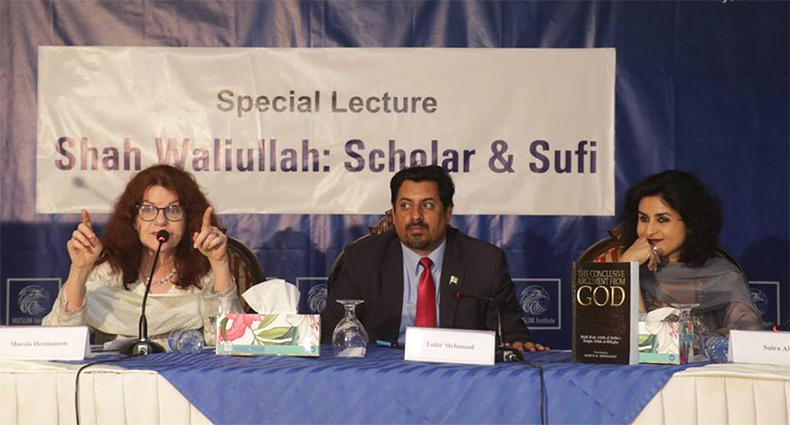 |
|
MUSLIM Institute organized a special lecture "Shah Waliullah: Scholar & Sufi" on Tuesday, March 06, 2018 at Islamabad. Professor Marcia K. Hermansen from Loyola University, Chicago, USA delivered the special lecture. Mr. Tahir Mehmood, Public Relations Coordinator, MUSLIM Institute gave the welcome remarks & vote of thanks. Dr Saira Alvi moderated the proceedings of the event.
|
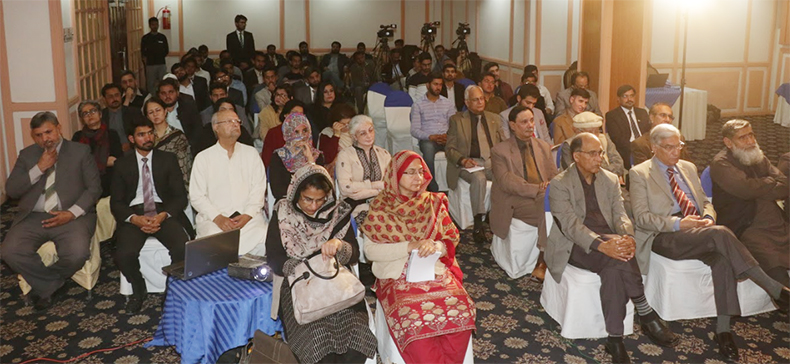
Participants of Lecture
|
|
Hazrat shah waliulllah is among such towering personalities who manifest Islam in letter and spirit. Not to speak of his philosophical contribution, his literary contribution is also worth mentioning. Shah Walliullah’s relation with the history of subcontinent cannot be denied. He was an educationist, philosopher, economist as well as a religious mentor. After completing his primary education, he went to Arabia for the further completion of his remaining studies. Today, his contribution can be felt in the aroma of each library of the world. in the field of philosophy, he was his name. He was truely impressed by Al-Bairuni and his geographical work looks inspired by the teachings of Muslim philosophers. Ibn e Sina, Al- Razi, Tusi and Al-baruni are among his source of inspiration. As far as knowledge is concerned, he was farfetched, and in accordance with the teachings of the Holy Quran. It was hard work that paid him the tribute of being Shah Waliullah. It is a common believe in the sub-continent that his was a pure thinker of Sunni School of thought. his affiliation with Haji Shariatullah of the sub-continent, made him another story. whether it be Faraizi Movement or Khilafat Movement, you will be finding Muslims of sub-continent following him in letter and spirit.
His views has never been found contradicting with any school of thought in terms of his views regarding the state and the will of the state. he ensures complete freedom in his concept of state. his was of the view that it is the duty and responsibility of the state to abide by the law of the state. in this respect, he also pledged to state. his state was the state of Madina. his state was the greek city state and his state was the state with citizen perspective. he was a man living with citizens not subjects. therefore, his concept of being a welfare state is among most popular precepts rendered by him. There were deliberate attempts made to prove that he belongs to a certain school of thought but there is no denying of the fact that he believes in visiting the shrines of Sufi saints.
|
|
|
The monumental work he achieved was the translation of the Holy Quran from Arabic to Persian, the language spoken by the Muslims at that time in India. Shah Wali Allah also wrote authentic books on Hadith, the principles of Hadith, Tafseer and on mystical subjects. But the most popular among them is “Hujjat Allah al-Baligha”. Hujjat Allah al-Baligha (The Profound Evidence of Allah) has two volumes the volume -I contain philosophical context. Which is systematic and integrative approach. Hujjat Allah al-Baligha combines hadith and qur’anic studies, Sufism, intellectual (rational analysis) historical, sociological, psychological dimensions, Cosmology, socio-political theory, human flourishing, and also the theory of religion. The other major works of Shah Wali Allah include, Al-Budur al-Bazigha, Al-Fauz al-Kabir fi Usul al-Tafsir and Al-Insaf fi bayan Sabab al-Ikhtilaf. Due to his work Shah Wali Allah is also called Ghazali of subcontinent.
Shah Wali Allah used the modern method of historical studies which shows that how much he was concerned with intellectual fragmentation of Islamic discipline. He also explains that why we understand the knowledge the way we do. A remarkable work which Shah Wali Allah is that he identified the need to find a way to explain spiritual dimensions as well as Shari‘a regulation which explain the purpose of religion which has benefits to the individual and society. This is often not explicit in the revealed sources—therefore ‘aql or reason must be invoked. Historical context and individual inclinations can lead to difference of opinion. When we find the differences in the works of different scholars then we need to go into the depth of those works and we find that this all is work in progress. In the preface of his book he writes each person is a ‘prisoner’ of his or her time. It is a very modern idea to think out of the box. Shah Wali Allah wrote about what meet the needs of the time, so he is also called the “thinker of crisis”.
|
|
|
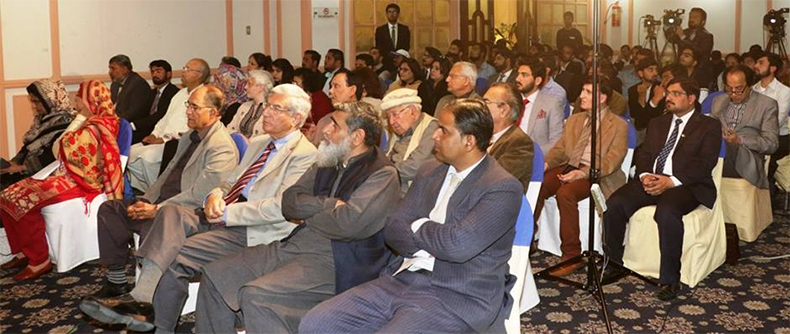
Hall View of lecture
|
|
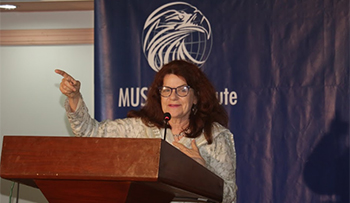
Shah Wali Allah also did contextual and thematic analysis. In his early works he gave three sources of knowledge Naql (transmission of revealed texts), Aql or burh?n) (demonstrative proof/reason) and Kashf (mystical disclosure). For Shah Wali Allah each of this source has potential source of truth so there should be integration of these sources rather than elimination of any of them. According to Shah Wali Allah sharia didn’t fall from the sky rather development of Islamic Law began with the interpretations of the Companions of Holy Prophet Muhammad (s.a.w) and Successors. After that there was era of emergence of Mazahib in a certain historical background followed by the era of Taqleed. If we find the modern method of development of Islamic law it is more or less the same as described by Shah Wali Allah. Shah Wali Allah’s father Shah Abdur Rahman who was a sufi of Naqshbandi order and his uncle was Chishti so he had the influence of both sufi orders. According to Shah Wali Allah in development of Sufism there is asceticism which could be traced in teachings of Junayd Baghdadi that is to connect heart to Allah. Then it is Ecstatic Sufism to eradicate Nafs which is also called Fan?, Khurasani Sufis paid much emphasis on it. The philosophical discourse on Sufism stems from the teachings of Ibn Arabi.
|
|
|
The term Latifa is derived from the Arabic word Latif meaning gentle, sensitive, or subtle. In Sufi terminology the term Latif first emerged in reference to the idea of a subtle body (jism- latif) associated with the spiritual dimension of the person. It was believed by the Sufis that this non-material part of the person was the most susceptible to spiritual discipline and exercises. Eventually the theoretically oriented Sufis developed systematic models and a terminology of these centres related to the various spiritual aspects of individuals in which each one of these particular aspects was considered a Latifa. some of these Lata'if have been diagrammed in the works of Shah Wali Allah with circular shapes as "subtle spiritual centres". Shah Wali Allah provides one of the most detailed explanations of the Lata'if to which he devoted an entire book, AIJaf al-Quds' as well as many references in his mystical works such as al-Tafhimat al-Ilahiyya. He presented the idea that the human beings had ten basic parts-five materials and five immaterial.
The lower level of the material parts consisted of the Lower Soul (nafs) and the four elements (fire, earth, air, and water), while the higher level consisted of the five lata'if. sometimes referred to as the five jewels (al-jawahir al-khamsa) the Heart (qalb), Spirit (ruh), Mystery (sirr), Arcane (khafi) and the Most or Super-Arcane (akhfa). The two levels of this system were said to correspond to the distinction between the World of God's Command (alam al-amr) and the World of God's Creation (alam al khlq), a distinction based on Quranic terminology and having a long history in Sufi thought. An example is the interpretation of the Quranic verse, "the Spirit is from the Command (amr) of my Lord" (17 :85), which is understood by the Sufis to mean that the human spirit (ruh) originates in the immaterial, timeless world of God's Command (alam al amr) at a level preceding any temporal, physical manifestation.
|
|
|
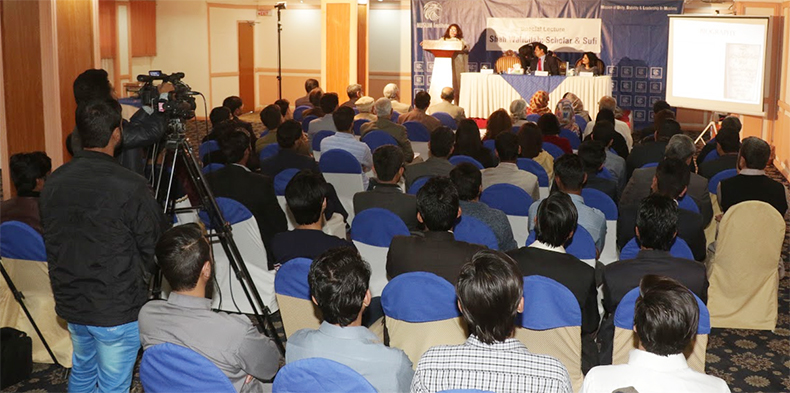
Hall View of Lecture
|
|
Shah Wali Allah presented the theory of mazhab and deen in Huja tul Baligha and he made distinction between mazhab and deen. Deen is a kind of um al kitab and mazhabs are Historical manifestation and they came according to the needs of that time. His theories present complete expression of historical mazhab and its relationship to deen.
|
| |
Interactive Session:
|
| |

Participants asking questions in interactive session
|
|
A fruitful discussion took place in interactive session it is summarized as follows:
Core of what SHAH WALI ULLAH says about pluralism is that he appreciated the facts that systems are evolved in change. In his early writings when he was in HARMAIN he wrote about ijtehad. He had a lot of facility for shafi methodology on ijtehad and also on malki. Its misunderstanding that there is no ijtehad after the 10th century, there was ijtehad it tended to be limited to the scholars with in scope. SHAH WALI ULLAH analyzed historical work on ijtihad, there were many recognized scholars such as Altabari who can be considered as mujtahid he was originally shafi but many of his decisions disagree with the Shafi. Nationalism in SHAH WALI ULLAH theory is Muslim nation state, a Muslim political order that is compatible with global pluralism.
|
| |
Download pdf
Newsletter
Share






